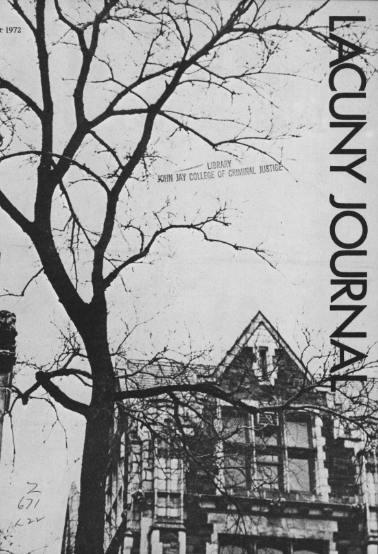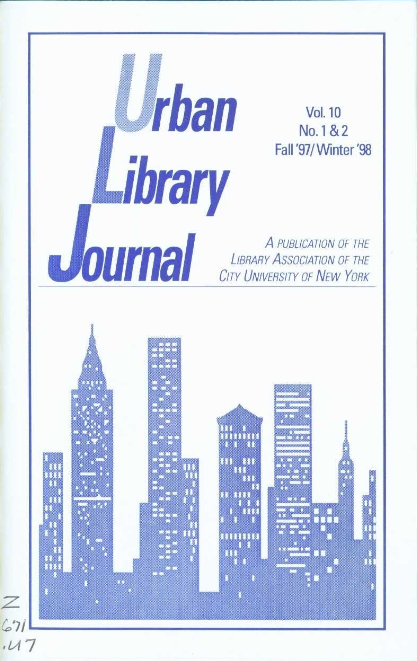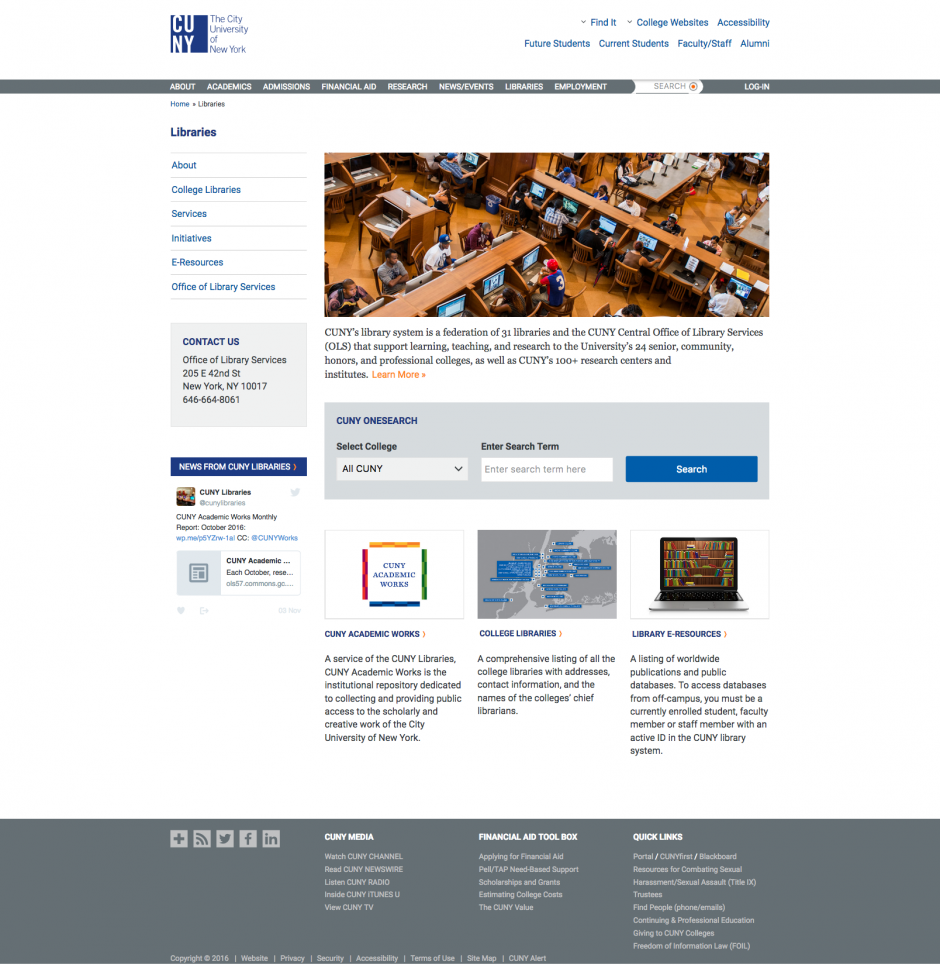Home » General (Page 2)
Category Archives: General
New look for the CUNY Libraries website!
With help from our friends in the CUNY Office of University Relations, the Office of Library Services’ website is now looking better than ever!
Not only is it more visually pleasing, but the content has been revised and the site tree trimmed. It should now be easier than ever to peruse the website and find the information you need, such as the Office of Library Services’ contact information, links to CUNY-wide e-resources, and information about the individual CUNY libraries.
On top of that, the website is fully responsive, too, so it molds to the constraints of your device! Further, it has been redesigned with accessibility in mind so it is now more navigable and practical for all of the site’s many visitors. (We average about 18,000 visits a month—that’s 640 visitors a day! Now everyone will be able to make the most of the website.)
If you come across any problems, please do not hesitate to the contact the CUNY Service Desk.
Winning with OLS Support Requests
When requesting help from the Office of Library Services, please consider these tips to move the work forward more efficiently on your behalf.
Pro-tips
1. Open a work order by emailing the CUNY Service Desk at [email protected]. (It is fine—and, in some cases, encouraged—to directly ask OLS staff members preliminary email questions prior to opening a work order.)
The subject of your email should read:
Product: XX – Brief description of request
where “Product” is the service/system (e.g., Aleph, Primo, SFX, etc.), “XX” is your two-letter campus code, and “Brief description of request” succinctly explains your problem or request.
* For issues related to CUNY Academic Works, please contact Megan Wacha directly at [email protected] or 646-664-8213.
2. If you are so inclined, copy an OLS staff member on your initial email to the CUNY Service Desk. This is especially relevant for urgent requests that require immediate attention.
- Aleph: Kevin Collins, [email protected]
- Primo: Allie Verbovetskaya, [email protected]
- EZproxy: Roland Samieske, [email protected]
- SFX: Roland Samieske, [email protected]
- E-Resource/Licensing: Nancy Egan, [email protected]
* For issues related to CUNY Academic Works, please contact Megan Wacha directly at [email protected] or 646-664-8213.
3. Always include your phone number and email address in your initial request.
4. Be specific and provide examples. This helps us identify and replicate what you are seeing. For example: mention the specific patron, bib record, item, or database in question; include permalinks or search keywords to help replicate a search; provide mockups for requested display/UI changes; supply off-campus credentials when reporting a problem with an e-resource or one facing remote users; and so on.
5. Add screenshots! (After all, a picture is worth a thousand words.) If you’re not sure how, learn how to capture screenshots in Windows or take a screenshot on your Mac.
6. Please mention any and all relevant deadlines as they apply to your request.
7. When asked follow-up questions by OLS staff, include that staff member on your email response.
By following these 7 tips, you can be sure that your request will be handled properly and addressed quickly!
If you notice that a CUNY library system is down, please follow the directions outlined in an earlier blog post: What to Do When an OLS Managed Service is Not Available.
What to Do When an OLS Managed Service is Not Available
In the event that any of the services OLS provides is not available—and you’ve not received any specific announcements from OLS or CIS—please check the OLS Systems Status page that, at a glance, will tell you if a service is running or not. There will be cases when a service indicator shows green (available) but from your particular campus or location outside of CUNY the service is unavailable, as a local factor might be the cause. No matter where the outage is experienced, please create a ticket (work order) with the CUNY Service Desk ([email protected]). Always let us know where you are experiencing the problem (i.e., on- or off-campus).
The Office of Library Services (OLS), CUNY’s Office of Computer & Information Services (CIS), and our primary systems vendors monitor and employ (365x24x7) internal alerting mechanisms for critical processes within CUNY Libraries’ ecosystems (Academic Works, Aleph [GUI/OPAC], CORAL, EZproxy, OneSearch, SFX) so, in most cases, we’re already aware of a problem and are working with our partners to restore services.
Please follow these steps when encountering a system or service that appears to be down:
- Check for announcements/notifications from OLS/CIS via CULIBS-L
- Check the OLS Systems Status page
- Create a ticket (work order) with the CUNY Service Desk
If you have never created a support ticket (work order) to report a service interruption/down system, it’s super easy! Just send an email to [email protected] and copy [email protected].
NOTE: We require that you copy [email protected] during system outages!
The subject of your email should contain three parts:
- The unavailable OLS service/system (e.g., Aleph, Primo, SFX, etc.),
- Your two-letter OWN code or library name, and
- A brief summary of your problem.
The body of your message should describe the problem as well as provide a screenshot or the exact text of the error message, if there is one. Please also let us know whether you are on- or off-campus.
Here’s an example:
To: [email protected]
Cc: [email protected]
Subject: Aleph: LE – Staff (GUI) Clients not Connecting to ServerService Desk,
We’re unable to connect to Aleph from the Circulation Desk here at Lehman Library. We’re getting a “connection refused” error message. The PC is connecting to the Internet, however, as we’re able to view the library web pages and the Aleph OPAC.
Thank you,
Lenny L.
Urban Library Journal launches in Digital Commons
The Office of Library Services is thrilled to announce the launch of Urban Library Journal on Academic Works’ Digital Commons platform. Published by the Library Association of the City University of New York (LACUNY), Urban Library Journal (ULJ) fills a gap in LIS scholarship by addressing the work of libraries and librarians in an urban setting.
Before it was Urban Library Journal
 In 1972, LACUNY launched its first journal, LACUNY Journal, as a means to make “the ideas of CUNY librarians known to each other and to colleagues in other departments of City University.” The Editorial Committee hoped to address a full range of subjects and perspectives – including controversial ones – in order to promote a free and open exchange of ideas and raise the professional goals of its membership. And it did just that. From profiles of CUNY libraries and librarians to articles about the relationship between libraries and open admissions to questioning the role ACRL plays in bringing libraries together, Volume 1, Issue 1 was a platform for the diverse voice, experiences, and perspectives present throughout CUNY Libraries.
In 1972, LACUNY launched its first journal, LACUNY Journal, as a means to make “the ideas of CUNY librarians known to each other and to colleagues in other departments of City University.” The Editorial Committee hoped to address a full range of subjects and perspectives – including controversial ones – in order to promote a free and open exchange of ideas and raise the professional goals of its membership. And it did just that. From profiles of CUNY libraries and librarians to articles about the relationship between libraries and open admissions to questioning the role ACRL plays in bringing libraries together, Volume 1, Issue 1 was a platform for the diverse voice, experiences, and perspectives present throughout CUNY Libraries.
In 1981, the LACUNY Journal was replaced by the Urban Academic Librarian, which expanded its scope and the conversation beyond CUNY, to librarians working in an urban academic setting. Michael O’Donnell, Chairperson of the LACUNY publications committee and a librarian at the College of Staten Island, introduced the first issue of this new publication with a call for change:
As the 1980s unfolded, urban academic librarians need to redefine their mission in order to achieve a balance between the academically desirable and the fiscally and physically feasible. By rejecting both the starry-eyed idealism of the Sixties and the “looking-out-for-number-one” cynicism of the Seventies, perhaps we can establish realistic and achievable goals. We hope this journal will help provide a free exchange of ideas.
Launch of Urban Library Journal
I n changing the name to Urban Library Journal in 1998, the members of the LACUNY publications committee opened the journal to all librarians working in an urban environment. The city, its institutions, and its people were under attack from politicians, their policies and their budgets. Editor Rolando Perez introduced the first issue under the journal’s new name by addressing the importance of its expanded scope:
n changing the name to Urban Library Journal in 1998, the members of the LACUNY publications committee opened the journal to all librarians working in an urban environment. The city, its institutions, and its people were under attack from politicians, their policies and their budgets. Editor Rolando Perez introduced the first issue under the journal’s new name by addressing the importance of its expanded scope:
“No true American lives in New York City,” commented Ronald Reagan while in office — a comment that though easily dismissed did set the tone for a certain attitude towards our cities. . .
This attitude, though somewhat tempered in the 90s, still domineers a lot of federal, state, and even local politics with respect to our cities. And though no politician today would make the same statement made by Reagan almost twenty years ago, a lot of the legislation that impact upon our cities, does reflect the unstated attitude of our politicians. It is reflected in the way our public education institutions have come under rhetorical and economic attack, it is reflected in the lack of funding for educational programs, and it is reflected in our elected officials’ attitudes towards the very institutions that support the cities, as for instance, our urban libraries.
As former co-editors Beth Evans and Sally Bowdoin note “shortly after the name change [to ULJ] the LACUNY publications committee began to recruit editorial board members outside of CUNY. In 2003, an advisory board of nationally recognized librarians, including E. J. Josey, University of Pittsburgh, James C. Welbourne, Enoch Pratt Free Library, and Neerejana Ghosh, New York School Library System, was established.”
ULJ became an online-only, open access publication in 2007 when it moved to the Public Knowledge Project’s Open Journal System. With this change, all urban librarians could not only submit to the journal, they could read it as well.
Urban Library Journal in Digital Commons

In moving to the Digital Commons platform, ULJ joins the larger Academic Works initiative at CUNY, or, to be more accurate, CUNY joins ULJ in the larger open access movement. It also marks the first journal to be published and supported by the Office of Library Services, a service we hope to grow in future years.
Under the leadership of editor Junior Tidal (City Tech), and with the deft support of web manager Valerie Forrestal (College of Staten Island), archived issues of ULJ dating back to 2007 have migrated to the new platform. As part of this process, Tidal and a LACUNY subcommittee comprised of Margaret Bausman (Hunter College), Mark Eaton (Kingsborough Community College), Charles Keyes (LaGuardia Community College), and Jessica Wagner (Baruch College) selected a new logo as part of a design contest hosted by Logosauce.com.
In addition to the visual redesign, ULJ worked with the Office of Library Services to make its policies and procedures more transparent to its readers and contributors. ULJ and the Office of Library Services thank the Journal of Librarianship and Scholarly Communication and its editors for providing permission to adapt its documentation.
The Office of Library Services is pleased to support Urban Library Journal as it moves forward, on its new home on Digital Commons.
Analytics: Getting to Know Our Users
Who is using OLS systems like the CUNY Catalog (Aleph), OneSearch, Academic Works, and this blog? What devices are being used to access our sites?
OLS wants to provide these and many other valuable answers. Most of the OLS library systems have some built-in reporting ability. Unfortunately, these systems are separate silos of information, not easily related to each other. In April 2015, OLS standardized use of Google Analytics (GA) on all platforms. We will be reporting on the information provided by GA and from the other, product-specific sources in future blog posts. The data provided below reflects GA data from April though December 2015.
So, now that we have all that data: Who are our visitors?
Language = English
99% CUNY Catalog (Aleph)
98% OneSearch
87% Academic Works
At Academic Works, these international uses are well distributed. The languages that reach 1% are: Chinese 2%; Spanish 2%; French 1%; German 1%, and Russian 1%.
33% Blog
Blog reader languages are, in fact, unclear because it has a high percentage of “unknown” language readers: 57%. The only other language over 1% is Russian at 9%.
Location = USA
99% CUNY Catalog (Aleph)
99% OneSearch
47% Blog
Blog reader locations are better reported than languages because the percentage of “unknown” locations is only 15%. The locations that reach 2% are Russia (12%), China (3%), and Japan and Germany at 2%.
***Academic Works — Deriving correct location information for Academic Works is a work in progress.
All Platforms
From where do our users do their searching?
Aleph OneSearch AcadWorks OLS Blog Desktop 96% 88% 85% 87% Tablet 2% 4% 4% 1% Phones 2% 8% 11% 12%
Browser (top 4)
Chrome 23% 45% 47% 68% Firefox 57% 19% 22% 12% I E 10% 15% 11% 5% Safari 10% 20% 16% 13%
OS, All (top 5)
Android 0% 3% 5% 1% IOS 2% 7% 9% 12% Linux 42% 1% 1% 1% Mac 16% 28% 22% 57% Windows 39% 61% 62% 26%
Mobile (tablet + phone)
Mobile Devices (top 5)
iPad 45% 29% 19% 4% iPhone 13% 25% 41% 89% Galaxy S5 2% 3% 2% 0% Unknown 23% 18% 9% 2% Win Tablet 6% 5% 1% 0%
Mobile OS (top 3)
Android 13% 24% 33% 5% IOS 58% 54% 60% 93% Windows 29% 22% 4% 1%
We’re in the process of building an analytics dashboard, so our next analytics post will include a link to the OLS Analytics dashboard.
If you’re interested in CUNY library analytics, be sure read Roland’s blog post: Impact of Primo on SFX


